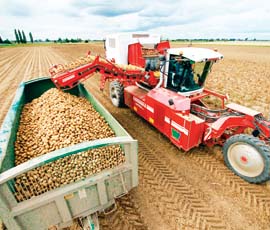Potato prices down as supply exceed demand

Potato prices have dropped again, with available supplies exceeding demand due to the early harvest.
The Potato Council’s weekly average price fell by 12% in the week to 19 August, to £120.65/t – £50/t below the same time last year. However, free-buy markets have dropped even more sharply in recent weeks, and are now more than £80/t lower than last year, at £90.44/t.
“Where farmers had water to irrigate, potato crops responded very positively to the sunshine in May, so there is likely to be a big crop this year,” said Nick Tapp, head of agribusiness at Bidwells. Last year, prices were the highest for 10 years, with drought in Russia boosting export demand. “This year, Europe and Russia seem to be having a reasonable harvest, so that demand won’t be there to underpin the market. It could be a pretty hard season for those growers selling on the free-buy market.”
Growers were now lifting more maincrop varieties, so contract prices were also declining, with early premiums likely to drop away further in the coming weeks. By 19 August, farmers had lifted 18% of the planted area, compared to 17% last year and 11% in 2009, said Jim Davies, senior analyst at the Potato Council. Plantings were also 0.4% higher, due to last year’s strong prices. “But there is still a long way to go – in previous years the weather has affected markets, so it will remain important as lifting progresses.”
Growers were burning off produce for storage earlier than normal, as some crops had reached their potential and started to senesce. “Crop health is generally good, although some blackleg and scab is reported. Greening is also apparent in some high yielding crops where they have broken the soil in the drills.
“General clearance rates have been helped by the strong movement of contract material and the ability to store earlier. However, free-buy crops, particularly early varieties, are slower on clearance.”
Free-buy demand for medium-size potatoes was helping the movement of the ware fraction of salad crops, and interest in salad varieties was also starting to improve, said Mr Davies. Baker supplies were ample due to the heavier than expected yields, and were difficult to sell at £100/t in the packing sector. In the bag market, interest in first early varieties was declining in favour of Sagitta, Caesar, Victoria, Cabaret and Maris Piper, with chipping movement heavily dominated by contract loadings.
